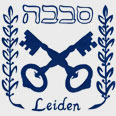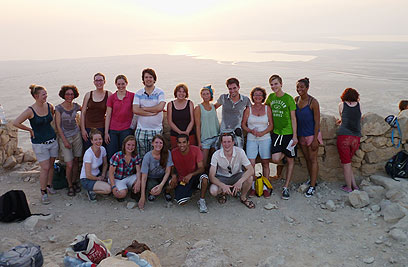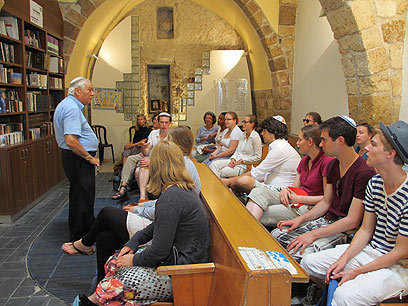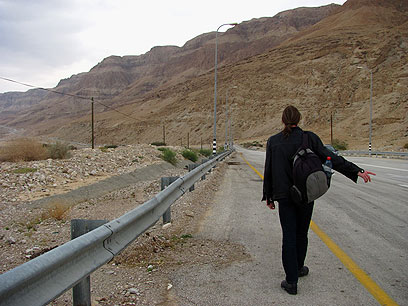
Dutch university's Hebrew club visits Israel
They get upset when asked why they study Hebrew though they're not Jewish, have heated debates on grammatical stems in Hebrew, and get excited over Israeli literature; meet the club for students of Hebrew at the Leiden University as they visit Israel
The instructor at Beit Hatfutsot, the Tel Aviv museum of Jewish Diaspora, was surprised by how well a group of Dutch students knew the history of the Jewish people. She couldn’t help herself from commenting how unusual it was to meet non-Jewish, non-Israeli students who were so familiar with Jewish culture and heritage.
They were all members of the Sababa club for students of Hebrew at the Leiden University in the Netherlands, on the club's trip to Israel.
The instructor's response is fairly typical. Israelis often find it hard to comprehend that students from all over the world devote themselves to the study of the Hebrew language and Jewish culture.
But the Sababa club for students of Hebrew consists of eager students of the Bible and its interpreters, such as Rashi and Nahmanides, as well as of modern Hebrew literature, such as the writings of Amos Oz and Meir Shalev.
In the summer of 2012, the Sababa club arranged a visit to Israel.
Passion for Hebrew
Julia van Zilfhout, 25, a graduate student of Religious Studies, chose Judaism as her major when she was an undergraduate, despite the fact that she had never met any Jews before.
"There was a mystery around it. It's something I always heard about but didn't really know much about. I just found it fascinating," Julia explained. "At the beginning I was frightened when they said I have to study Hebrew, but I'm glad I did it."
Her friend Maartje Valk, 24, also a student of Religious Studies, said that she was not required to learn Hebrew, but she felt that if she wanted to understand Judaism, she had to learn the language.

The Sababa club in Masada (Photo: Hannes Vlaardingerbroek)
Though the number of students who study Hebrew as part of their curriculum is only 14, there are others who choose to learn the language, and the Sababa club numbers 30 students, half of whom joined the visit to Israel.
The faculty member that accompanied the group, Dr. Hannah Neudecker, a Jew on her father's side, started to explore her roots when she was 18, and decided to learn Hebrew. As part of her academic journey, she also attended the Hebrew University in Jerusalem, and her PhD focused on the Turkish translation of the Hebrew Bible at the 17th century.
On Jewish holidays, the students of the Sababa club gather at Dr. Neudecker's house.

The students at a synagogue in Akko (Photo: Hannes Vlaardingerbroek)
Anne Drijvers, 22, and Hannes Vlaardingerbroek, 31, have both been to Israel before. They established the Sababa club mainly for the purpose of visiting Israel again, but it eventually expanded into a networking and activism club, promoting research of Jewish thought as well as bringing together those who take interest in the field.
"One of the things we like about Sababa is that we don't have to explain to each other why we like the language and studying it so much, we just understand," Julia said. "In the middle of just a normal conversation we can start talking about a word in Hebrew and its shoresh, (grammatical stem) and if you look from the outside you don't understand what we're doing."
To which Anne adds: "Basically, we are just a bunch of nerds, but we're fun."
Hannes is fluent in Hebrew and is also the most familiar with Israeli society in the group, as he not only volunteered in a kibbutz – a common Israeli experience – but also lived in Tel Aviv for a year and took a semester at the Hebrew University in Jerusalem. This year, he started his master's degree in Hebrew studies at the University of Leiden.
Poetry
As the group walked by the Tel Aviv apartment building in which the early 20th century Israeli poet Rachel Bluwstein resided, Hannes exclaimed excitedly, "That's what I love about this place. It's all so full of emotion. Everything has a song in Hebrew; people have associations for those songs and words are so rife with emotion and meaning.""In Holland," Hannes explains, "a large portion of the local music is written in English, and the Dutch language is usually reserved for old nationalistic or folkloristic songs."
"But it's not only about the songs;" he insists, "it's the entire Israeli culture – its depths, life here in general, Zionism. Sometimes it takes on a nationalistic approach, but I think it's mainly because the Israeli-Jewish experience is so dependent on an old and rich culture. It's remarkable how present it still is."

Hannes near the Dead Sea. 'That's what I love about this place. It's all so full of emotion' (Photo: Hannes Vlaardingerbroek)
When asked whether depth and history can also be a burden, Hannes admitted that though he could identify with the inevitable strain such a longstanding legacy can cause, he was nonetheless in awe when faced with the profundity of the Israeli-Jewish-Hebrew context. "The first time I came to Israel," he said, "I didn’t know much about the language and the culture. Now I know a lot more and I'm enchanted. In general it makes you want to be a part of it."
Foreign affairs
Anne and Maartje have also visited Israel in the past. But for many in the group, this was their first time. Julia, who was familiar with the various forms of Jewish belief as well as with the controversy surrounding the Tal Law was especially excited to visit the Western Wall.
"It was just amazing for me," Julia recounted the visit. "It was weird and also it meant so much to the people who were standing there and praying. Suddenly you see this place that you've read about and you've known about for a long time. Suddenly you're there. For me it was just… breathtaking. I was like 'I have to focus now'. That was a high point."
In general, it seems that most members of the group try to avoid discussing politics, though some of them have been to the Palestinian Authority and are undoubtedly well-informed in Middle East current affairs.
"The more I learn, the more neutral I become," Maartje said.
The students said they have not encountered any animosity toward Judaism or Hebrew, nor any anti-Israeli sentiments in the academia.
"The most 'negative' responses were from Israelis who asked 'why do you study Hebrew?'" Anne remarked, to which Martje added: "When people study Buddhism or Islam nobody wonders; you don't need to explain anything."
"When we came into Israel," Anne concluded, "during the security check the guy asked me why Hebrew and I just said 'it's cool.' And I got a smile."
- Receive Ynetnews updates directly to your desktop










